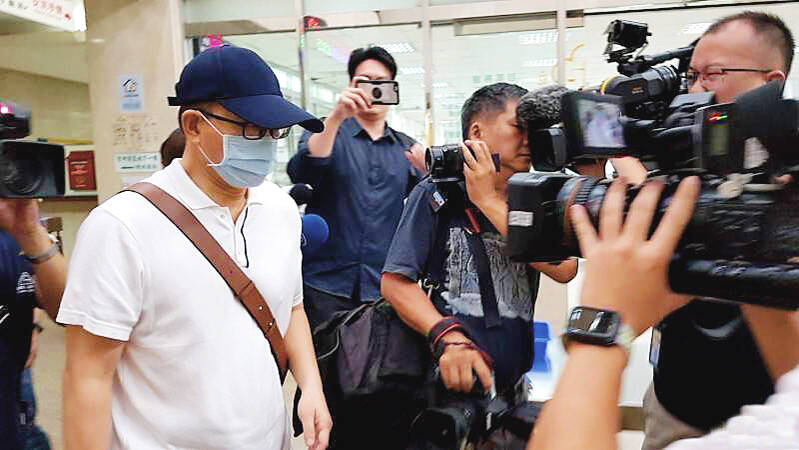The Supreme Court has upheld the High Court’s verdict on a 2019 vote-buying case as well as the sentence of the main defendant — a prison sentence of three years and two months for contravening the Presidential and Vice Presidential Election and Recall Act (總統副總統選舉罷免法).
The Supreme Court’s ruling is final.
Association of Taiwan Investment Enterprises Changsha City Branch chairman Lin Huai (林懷) was accused of receiving funds from the Chinese Communist Party and using them to encourage others to cast their presidential ballot in the 2020 election for then-Chinese Nationalist Party (KMT) presidential candidate Han Kuo-yu (韓國瑜) and their party ballot for the KMT.

Photo: Wu Cheng-feng, Taipei Times
Taiwanese who returned home from China to vote would be eligible for a 1,500 yuan (US$210) subsidy and 467 people took advantage of the subsidies.
The first ruling, issued by the Taipei District Court, gave Lin a prison sentence of three years and 10 months, while the High Court, citing that Lin pleaded guilty to contravening Item 1, Article 86 of the act, reduced the sentence to three years and two months while disenfranchising Lin for four years.
Chinese Women’s Federation deputy secretary Shen Bin (沈斌), China New Family Association chairwoman Chiang Ming-sia (蔣明霞), Hunan Shaoyang City Association in Taiwan director Chang Guo-jun (張國君) and Changsha City-based Taiwanese businessman Chuang Huan-chang (莊桓漳) were handed prison sentences of one year and eight months in the first ruling.
The High Court sustained that ruling, but considering that the four had only helped transfer the funds, compiled a list of attendees and had pleaded guilty, deferred the sentences for five years.
The four had to pay NT$200,000 to the state and undergo 30 hours of legal education. They did not appeal and their sentences were final after the first ruling.
Taipei-based Chinese Women’s Federation chairwoman Ho Jianhua (何建華) and Association of Taiwan Investment Enterprises in Changsha deputy chairman Tung Chien-hua (佟建華) were declared not guilty in both the first and second rulings.

Alain Robert, known as the "French Spider-Man," praised Alex Honnold as exceptionally well-prepared after the US climber completed a free solo ascent of Taipei 101 yesterday. Robert said Honnold's ascent of the 508m-tall skyscraper in just more than one-and-a-half hours without using safety ropes or equipment was a remarkable achievement. "This is my life," he said in an interview conducted in French, adding that he liked the feeling of being "on the edge of danger." The 63-year-old Frenchman climbed Taipei 101 using ropes in December 2004, taking about four hours to reach the top. On a one-to-10 scale of difficulty, Robert said Taipei 101

Nipah virus infection is to be officially listed as a category 5 notifiable infectious disease in Taiwan in March, while clinical treatment guidelines are being formulated, the Centers for Disease Control (CDC) said yesterday. With Nipah infections being reported in other countries and considering its relatively high fatality rate, the centers on Jan. 16 announced that it would be listed as a notifiable infectious disease to bolster the nation’s systematic early warning system and increase public awareness, the CDC said. Bangladesh reported four fatal cases last year in separate districts, with three linked to raw date palm sap consumption, CDC Epidemic Intelligence

Two Taiwanese prosecutors were questioned by Chinese security personnel at their hotel during a trip to China’s Henan Province this month, the Mainland Affairs Council (MAC) said yesterday. The officers had personal information on the prosecutors, including “when they were assigned to their posts, their work locations and job titles,” MAC Deputy Minister and spokesman Liang Wen-chieh (梁文傑) said. On top of asking about their agencies and positions, the officers also questioned the prosecutors about the Cross-Strait Joint Crime-Fighting and Judicial Mutual Assistance Agreement, a pact that serves as the framework for Taiwan-China cooperation on combating crime and providing judicial assistance, Liang

US climber Alex Honnold left Taiwan this morning a day after completing a free-solo ascent of Taipei 101, a feat that drew cheers from onlookers and gained widespread international attention. Honnold yesterday scaled the 101-story skyscraper without a rope or safety harness. The climb — the highest urban free-solo ascent ever attempted — took just more than 90 minutes and was streamed live on Netflix. It was covered by major international news outlets including CNN, the New York Times, the Guardian and the Wall Street Journal. As Honnold prepared to leave Taiwan today, he attracted a crowd when he and his wife, Sanni,